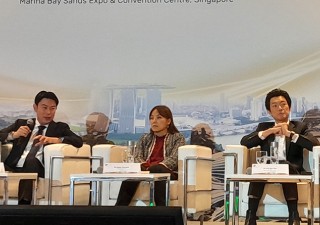Trademarks are a Major Contribution to GDP, Exports, and Jobs says Study
30 August 2017

Singapore, August 30, 2017 – A new impact study released today by the International Trademark Association (INTA) reports that industries which intensively use trademarks contribute significantly to five major economies in the Association of Southeast Asian Nations (ASEAN) region. Analysis from The Economic Contribution of Trademark-Intensive Industries in Indonesia, Malaysia, the Philippines, Singapore, and Thailand indicates that trademark-intensive activities generate increased employment across sectors and added contributions to international trade. Trademark-intensive industries are defined as those industries which file more trademarks than other industries–weighted against total employment in that industry.
These five jurisdictions were selected as, together, they represent 90% of ASEAN GDP explained INTA CEO Etienne Sanz de Acedo . “The study shows how important IP is to the economies of the region” he said.
The release of the study coincides with the 50th anniversary of ASEAN, which has grown to become the world’s seventh-largest market and home to the third-largest labour force. INTA commissioned the report from Frontier Economics, an internationally recognized economics research firm. “This is the first study to focus on the effects of trademarks specifically, as opposed to IP protection generally” explained James Ross, a director at Frontier Economics. The study is the first of its kind to analyze the correlation between trademarks and their economic impact on contribution to GDP, share of exports, and employment in major markets of Southeast Asia.
“A great brand is key to business success, especially in the digital economy, where there is intense competition for consumer attention. Companies that know how to use the right trademark strategy to protect their brand and grow it globally will have a strong edge over their rivals,” says Daren Tang, Chief Executive, Intellectual Property Office of Singapore (IPOS). “More broadly, the findings affirm the importance of IP as a business asset and a driver of Singapore’s future economic growth. IPOS, as an innovation agency, will build the right ecosystem to help businesses identify, protect, and more critically, commercialise their IP in Singapore and beyond into international markets,” he adds.
“From employment to share of exports, this study illustrates the remarkable degree to which trademark-intensive activities positively impact the Singaporean economy,” noted INTA Member Ai Ming Lee, Consultant, Dentons, Rodyk & Davidson, LLP in Singapore. "Brands and trademarks are a key driver of innovation and economic development. This study reaffirms the Singapore government’s efforts in this area.”
 Sanz de Acedo said the results of the new study “underscore the immense potential for cross-sectoral economic growth that can be unlocked by promoting the value of trademarks with the business community, government, and the general public, and by further developing national trademark systems and trademark-intensive industries. As we explore the long-term economic and social implications of trademarks and related IP rights, it becomes increasingly important for both public and private sectors to scale up engagement on this issue, as well as support government efforts to further trademark and brand development and protection, including protection of goods in transit.”
Sanz de Acedo said the results of the new study “underscore the immense potential for cross-sectoral economic growth that can be unlocked by promoting the value of trademarks with the business community, government, and the general public, and by further developing national trademark systems and trademark-intensive industries. As we explore the long-term economic and social implications of trademarks and related IP rights, it becomes increasingly important for both public and private sectors to scale up engagement on this issue, as well as support government efforts to further trademark and brand development and protection, including protection of goods in transit.”
Building on similar methodologies used by the European Union Intellectual Property Office (EUIPO) and the United States Patent and Trademark Office (USPTO), findings from the ASEAN report echo emerging analytical trends with regard to trademark-intensive activity. Within the five surveyed jurisdictions, trademark-intensive industries contributed between 17% and 50% of GDP, and between 13% and 29% of total employment. “Trademarks are a major driver of economic growth, employment and exports, regardless of the level of economic development of a country” said Ross.
By comparison, in the European Union, from 2011 to 2013, IP-intensive industries generated more than 42% of total economic activity; trademark-intensive industries alone produced 36% (€4.8 trillion) of that activity and generated nearly 46 million jobs (21%). A similar study conducted by the USPTO also found that IP-intensive industries continue to be a major, integral, and growing part of the U.S. economy. In 2014, trademark-intensive industries accounted for 23.7 million jobs in the U.S. In Latin America, according to a recent study commissioned by INTA of trademark-intensive industries in Chile, Colombia, Panama, Peru, and Mexico, from 2010 to 2014, their contribution to GDP varied between 10% and 21%, and workers’ share of the workforce ranged from 8% to 26% of total employment.
The ASEAN impact study was officially launched during IP Week @ SG 17, and can be downloaded here. - Darren Barton





